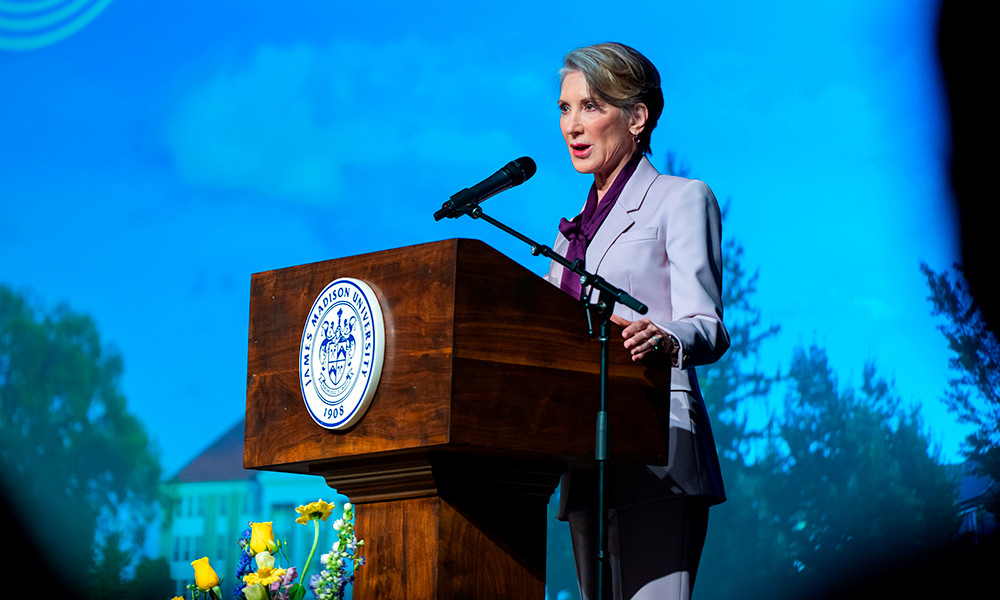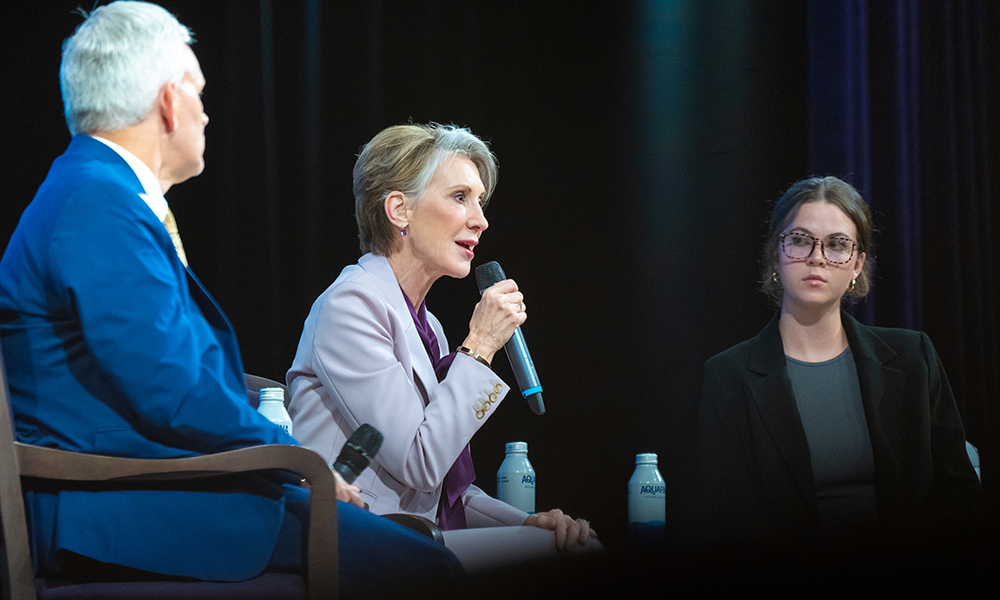Carly Fiorina urges students to challenge the status quo
Business executive says future leaders can learn the fundamentals from looking at how Jamestown became the world’s first representative government
Nation and World
SUMMARY: In honor of Constitution Day, Carly Fiorina urged students to consider how they might change the world during her Madison Vision Series presentation, “To Create a More Perfect Union …”
Recalling her first full-time job as a receptionist at a nine-person real estate firm, business executive Carly Fiorina said it was encouragement from company founders George Marcus and William Millichap that emboldened her to learn about business and earn her Master of Business Administration.
At the time, Markus & Millichap Inc. was much smaller. Today, it employs 2,000 and is worth $1.15 billion.
“To this day, I have never forgotten what it felt like to have someone see more potential than others might realize, or that I, myself, thought was possible,” Fiorina told listeners during a Sept. 20 lecture in Wilson Hall.
One of many ideas she stressed to students who attended the special Madison Vision Series presentation, “To Create a More Perfect Union …” — in honor of Constitution Day, which was Sept. 17 — Fiorina also urged listeners to consider how they might change the world.
“This is the only country founded not on ethnicity or territory or religion, but instead on a unique combination of practical experience and inspiring ideas,” she said
“In our Constitution, it is the citizen who is sovereign — not the president, not the political party, not the governor,” she said. “Our greatest strength lies in our sovereign American citizens who gathered together to build something better. And it is the framework of the Constitution that enables the innovation and the collaboration necessary to solve problems.”
Fiorina was the first woman to lead a Fortune 50 company as CEO and president of Hewlett-Packard Co. in 1999 and run for president of the United States in 2015. She has advised the CIA and departments of Defense, State and Homeland Security; she founded Carly Fiorina Enterprises to bring her expertise to private-sector teams and The Unlocking Potential Foundation to help those in the social sector benefit from her experience.
She’s also written three best-selling books on leadership and is a member of the newly formed American Bar Association Task Force for American Democracy, which aims to improve citizen confidence in elections.
Fiorina, who majored in medieval history and philosophy, referenced Plato when declaring that “ideals and principles are real and powerful, [and] can drive change.”
Recalling how Jamestown, America’s first colonial settlement, overcame initial failure during its first year in 1609, she presented the story as a “business case” for how leaders might learn from those closest to a problem (the settlers) when determining how best to find solutions (survive and prosper in a new world.)
“People closest to the problem usually know best how to solve it, if only we will ask. Sadly, we so often don’t ask,” she said. “[An] interplay between practicality and idealism is America’s story and our gift to the world.”
Fiorina also challenged listeners not to ignore the problems they see around them.
Passivity is the greatest hurdle to solving problems, she said.
Along her climb up the corporate ladder, Fiorina learned several valuable lessons on how to foster change:
-
Problems abound because people aren’t prepared to do what’s necessary to solve them.
-
Solving problems requires challenging a powerful status quo that means facing resistance and criticism, experiencing setbacks and making people uncomfortable.
-
Effective problem-solvers look to make progress, not achieve perfection.
-
Problem-solving is difficult and begins with a focus on close-up, on-the-ground issues affecting neighborhoods and households before larger work can be done.
-
Well-meaning problem-solvers often ignore their resources because they think they know what’s best and are smarter than others who might help.
Additionally, she said, management is not the same as leadership.
“Managers do the best they can with the way things are,” she said. “Leaders, however, change the way things are. … The best leaders are those who know success is achieved by unlocking potential in others. This is a leader’s highest calling.”
Joining Fiorina in Wednesday’s presentation were JMU President Jonathan R. Alger and Emma Niland, a fourth-year Political Science major and Spanish minor.

Fiorina, a member of the Board of Visitors who has two granddaughters (one JMU student and one alumna), urged attendees to learn more about the past to better inform their present.
“History honors the past by taking its struggles seriously,” she said. “History, when told completely and fully, is a mirror into which we look to see ourselves more clearly.”
Although Jamestown became “the first representative government ever” in 1619 after only 10 years, she also noted how it immediately started prospering on the backs of enslaved Africans, who arrived in chains on slave ships that same year.
Jamestown’s residents were initially horrified, she said, but they soon became complacent in thinking they couldn’t achieve the sort of progress they wanted without demeaning, subjugating and seizing power from others.
“So began the normalization of the idea that some are more human than others,” Fiorina said.
But real, transformative change for the better can only happen through listening and empathizing with others and telling their stories accurately.
“Sometimes we try to convince ourselves that if power is only concentrated in good hands or the right hands that it will not be abused, and the best outcomes will be achieved,” she said. “Both business experience and political history teach us otherwise. Pure motives, good intentions and even promising beginnings cannot change the reality that a group of few people is never smart enough or capable enough to make all the myriad of right decisions on behalf of the many. And the exercise of concentrated power becomes an end in and of itself. It is why so often the driving purpose of the powerful becomes self-preservation.”
Urging more understanding, cooperation, listening and discussion, she said everyone has the power to affect change in the world.
“Being the Change is not just a slogan,” she said. “Being the Change matters. Becoming fully prepared to be educated and enlightened citizens matters. And it is a noble and necessary mission to form a more perfect union is not a task that falls to someone else. As with the Americans that came before us and those that will follow, the work to create a more perfect union is our privilege and our responsibility as American citizens.”
